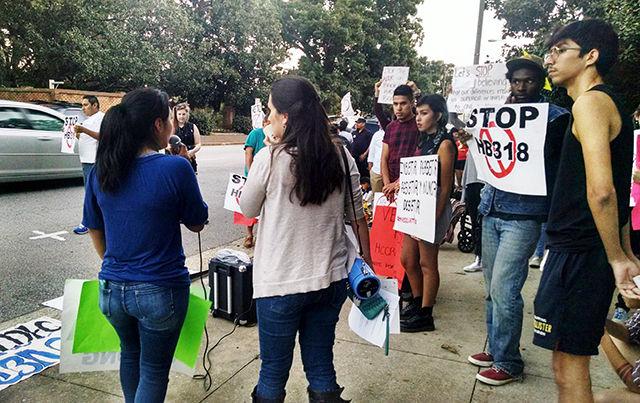On Sept. 29, House Bill 318, also known as the ‘Protect North Carolina Workers Act,’ was ratified. On the 30th, it was presented to Gov. Pat McCrory and left to his discretion for 30 days.
McCrory’s deadline is drawing near. He has until Oct. 30 to make a decision. It needs to be either signed into law or vetoed and sent back to the House of Representatives.
What exactly is the bill?
Looking at the skeleton of HB 318, it focuses on how an individual can be legally employed in North Carolina. It also increases the number of employees required to use E-Verify for work authorization.
According to the NC Department of Labor, E-Verify is an online system that allows employees to electronically verify the employment of newly hired employees. The system is jointly operated by the U.S. Department of Homeland Security and the Social Security Administration.
The bill establishes seven legal forms of official identification:
A pay stub with the payee’s address
A utility bill showing the address of the applicant-payor
A contract for an apartment, house, modular unit or manufactured home with a North Carolina address signed by the applicant
A receipt for personal property taxes paid
A receipt for real property taxes paid to a North Carolina locality
A current automobile insurance policy issued to the applicant and showing the applicant’s address
A monthly or quarterly financial statement from a North Carolina regulated financial institution
The bill excludes documents provided by foreign consulates or embassies.
Any worker found without one of the acceptable forms of identification can then be alerted to local law enforcement and/or the U.S. Immigration and Customs Enforcement (ICE).
HB 318 also forbids local governments or law enforcement agencies from creating policies or ordinances to allow the acceptance of documents not listed within the bill.
In addition, the bill prohibits the counties and cities of North Carolina from adopting sanctuary ordinances. These ordinances, also known as Sanctuary City Policies, essentially limit the extent to which law enforcement will go to assist the federal government with immigration issues. According to CNN, more than 200 local and state governments have adopted these policies and do not honor ICE requests for detention.
Within the bill, there is a provision that would prohibit waivers for federally time-limited food assistance. This would impact unemployed individuals without dependents, restricting access to food stamps.
The bill is unpopular with some. The North Carolina State AFL-CIO, the largest association of local unions and union councils in the state, attacked the bill, calling it the “Abuse NC Workers Act.” The association claims that the HB 318 targets immigrants who carry foreign IDs, makes it harder for police to protect the public and makes it easier for employers to exploit immigrants.
Proponents of the bill, such as the Federation for American Immigration Reform, claim that it prevents wage depression, which is due to the willingness of undocumented workers to work for lower pay. The federation said that the bill would also help employers comply with federal laws.
What does it mean for North Carolina?
On Oct. 14, a protest was held in front of the Governor’s Mansion. Students, workers and community members came out to voice their opinions of HB 318.
“I think this bill is framed as being something good for the state, but in actuality it’s hindering the livelihood and the ability of people to feel safe in this state,” said José Cisneros, a protestor and a junior at UNC-Chapel Hill studying history. “Personally, I am an undocumented immigrant, but I have some form of legal protection through DACA, for childhood arrivals. But my parents don’t have any sort of legal protection, their driver’s licenses are expired. So every day they drive, they could get stopped, get a citation and, in worst case, they could be investigated and get sent to ICE directly. Any kind of documentation that they have is not valid, now including their consular ID. This is the main problem with this bill: It invalidates the use of consular IDs as a legal form if identification.”
Yerson Padilla, a protestor and a junior at NC State studying women’s and gender studies and political science, said that the bill is riddled with problems.
“It’s trying to protect the jobs that immigrants ‘steal’ and that is really damaging,” Padilla said. “Personally, I am not affected by this bill because of my legal status, but I have friends and fraternity brothers who struggle. Their families struggle, and struggle to provide for themselves. We’re creating more barriers to add to the institutional relationship between immigrants and the rest of the population. It just goes to show how anti-immigrant North Carolina is, and do we really want to be perceived in that way?”
Advocacy and Organizing Director of Student Action with Farmworkers Nadeen Bir-Zaslow said she has been an active opponent of the bill because of the impacts it will have on the people of North Carolina.
“What I am afraid of if this bill passes is a North Carolina where immigrants who contribute so much are afraid to call the police to report a crime, and an atmosphere where people may not be able to register their kids in schools or even get a library book because they don’t have a recognized form of identification,” Bir-Zaslow said. “When a bill becomes a law there is gray area on how it is institutionalized. That is where advocates have to step up and educate the community on what their rights are, and also educate governments on if they are overstepping the rights of the community members.”
Starting today, McCrory has 10 days until he must sign or veto HB 318. If he does nothing, it will, by default, be given to the Secretary of State Elaine Marshall and become law.
To read House Bill 318, click here.








